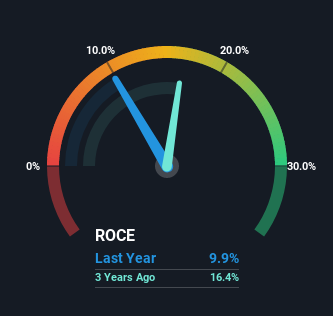- United Kingdom
- /
- Consumer Durables
- /
- LSE:BTRW
Barratt Developments' (LON:BDEV) Returns On Capital Not Reflecting Well On The Business

Did you know there are some financial metrics that can provide clues of a potential multi-bagger? Amongst other things, we'll want to see two things; firstly, a growing return on capital employed (ROCE) and secondly, an expansion in the company's amount of capital employed. Ultimately, this demonstrates that it's a business that is reinvesting profits at increasing rates of return. Although, when we looked at Barratt Developments (LON:BDEV), it didn't seem to tick all of these boxes.
Return On Capital Employed (ROCE): What Is It?
Just to clarify if you're unsure, ROCE is a metric for evaluating how much pre-tax income (in percentage terms) a company earns on the capital invested in its business. To calculate this metric for Barratt Developments, this is the formula:
Return on Capital Employed = Earnings Before Interest and Tax (EBIT) ÷ (Total Assets - Current Liabilities)
0.099 = UK£644m ÷ (UK£8.2b - UK£1.7b) (Based on the trailing twelve months to June 2022).
So, Barratt Developments has an ROCE of 9.9%. In absolute terms, that's a low return but it's around the Consumer Durables industry average of 12%.
See our latest analysis for Barratt Developments

In the above chart we have measured Barratt Developments' prior ROCE against its prior performance, but the future is arguably more important. If you'd like to see what analysts are forecasting going forward, you should check out our free report for Barratt Developments.
What The Trend Of ROCE Can Tell Us
When we looked at the ROCE trend at Barratt Developments, we didn't gain much confidence. To be more specific, ROCE has fallen from 16% over the last five years. However it looks like Barratt Developments might be reinvesting for long term growth because while capital employed has increased, the company's sales haven't changed much in the last 12 months. It may take some time before the company starts to see any change in earnings from these investments.
In Conclusion...
In summary, Barratt Developments is reinvesting funds back into the business for growth but unfortunately it looks like sales haven't increased much just yet. Additionally, the stock's total return to shareholders over the last five years has been flat, which isn't too surprising. All in all, the inherent trends aren't typical of multi-baggers, so if that's what you're after, we think you might have more luck elsewhere.
On a separate note, we've found 1 warning sign for Barratt Developments you'll probably want to know about.
While Barratt Developments may not currently earn the highest returns, we've compiled a list of companies that currently earn more than 25% return on equity. Check out this free list here.
Valuation is complex, but we're here to simplify it.
Discover if Barratt Redrow might be undervalued or overvalued with our detailed analysis, featuring fair value estimates, potential risks, dividends, insider trades, and its financial condition.
Access Free AnalysisHave feedback on this article? Concerned about the content? Get in touch with us directly. Alternatively, email editorial-team (at) simplywallst.com.
This article by Simply Wall St is general in nature. We provide commentary based on historical data and analyst forecasts only using an unbiased methodology and our articles are not intended to be financial advice. It does not constitute a recommendation to buy or sell any stock, and does not take account of your objectives, or your financial situation. We aim to bring you long-term focused analysis driven by fundamental data. Note that our analysis may not factor in the latest price-sensitive company announcements or qualitative material. Simply Wall St has no position in any stocks mentioned.
About LSE:BTRW
Barratt Redrow
Engages in the housebuilding business in the United Kingdom.
Flawless balance sheet with reasonable growth potential.


